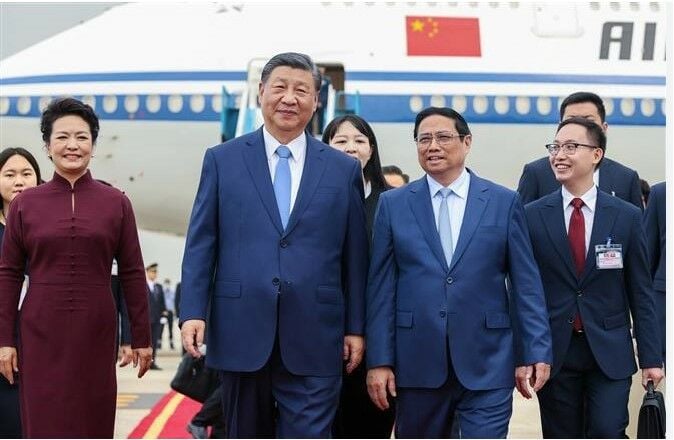Xi Jinping’s game-changing Vietnam visit: Unprecedented power plays

China‘s President Xi Jinping descended upon Vietnam for a two-day spectacle, strategically timed just three months after US President Joe Biden‘s high-profile visit.
The Chinese president kicked off his much-anticipated two-day sojourn in Vietnam on December 12, marking his first visit to the nation in six years. The intricate dance of diplomacy has been underway for months, with initial contemplation of synchronising the visit with Biden’s – a move that could have upstaged the US President’s visit to Hanoi.
At the heart of this diplomatic tango lies the aim of fortifying relations between the two Communist-led nations, known for their robust economic ties but mired in disputes over the South China Sea boundaries and a historical backdrop of millennial conflicts.
The delay in Xi’s visit is not merely a logistical hiccup but a result of protracted negotiations over the delicate phrasing of an elevated bilateral relationship. Beijing, keen on dubbing it a common destiny, faced resistance from Hanoi, though eventual acceptance seems to be on the horizon, according to insiders.
Chinese Ambassador to Vietnam, Xiong Bo, teased that the visit would be inked with dozens of cooperation documents, promising a tangible elevation above the US-Vietnam relationship. The spotlight shines on anticipated deals, with Chinese investments earmarked for upgrading rail links between the neighbouring countries, potentially involving grants of undisclosed value and unclear loan terms.
Transport ties take centre stage, with both nations eyeing enhanced connectivity. Vietnam eyes expanded exports to China, especially in the agricultural sector, while Beijing seeks deeper integration of northern Vietnam into its southern supply chain networks. This synergistic move aligns with a surge in Chinese companies relocating operations to Vietnam, amplifying momentum amidst the aftermath of the pandemic and the tempestuous US-China trade tensions, reported Asia One.
China’s ambitious plans
Proposed rail enhancements promise to streamline the import of components from China, effectively extending China’s ambitious Belt and Road Initiative (BRI) through Vietnam, and solidifying it as a vital hub in the New Silk Road.
Beyond railroads, China’s ambitious Digital Silk Road beckons Vietnam, hinting at potential investments in undersea optical fibre cables, the 5G network, and other telecom infrastructure. Notably, Vietnam, cautious of aligning too closely with Beijing, has, so far, discreetly navigated its involvement in BRI projects, exemplified by the Hanoi metro – a project veiled in subtlety.
































